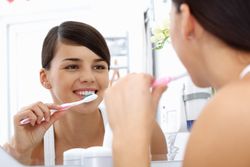
If you experience pain when eating cold or hot foods, while brushing your teeth, or in cold weather, you may have sensitive teeth. It’s a common problem, but it can affect your daily routine. While you should discuss this issue with your dentist, below are a few ways to manage your symptoms.
Do:
Use special toothpaste.
There are several types of specialized kinds of toothpaste designed to protect enamel and desensitize teeth. These typically include ingredients such as potassium nitrate and strontium chloride, which prevent pain by blocking the tubules in the tooth dentin, which transmit pain signals from nerves to the brain. Look for a toothpaste that includes one of these ingredients as well as stannous fluoride, instead of sodium fluoride.
Wear a nightguard.
Bruxism, or grinding teeth, is one common cause of tooth sensitivity and jaw pain. Typically, people do this unconsciously in their sleep or when they are anxious. Over time, it can cause the enamel to erode and gums to recede, resulting in sensitivity. A night guard can prevent you from grinding. Ask your dentist for an approved device as one that is too soft will not be effective.
Brush gently.
 Many people brush too hard, which harms the gums and wears down the enamel. Use a soft-bristled brush and brush gently in a circular motion with moderate pressure for at least two minutes. Cleaning for less than two minutes will not efficiently remove all of the bacteria that can build up and become plaque.
Many people brush too hard, which harms the gums and wears down the enamel. Use a soft-bristled brush and brush gently in a circular motion with moderate pressure for at least two minutes. Cleaning for less than two minutes will not efficiently remove all of the bacteria that can build up and become plaque.
Don’t:
Consume many acidic foods & drinks.
Acidic foods and drinks such as alcohol, coffee, soda, vinegar, and certain fruits can break down enamel, exposing the sensitive tooth dentin beneath. You don’t have to cut out such foods entirely, but it is a good idea to cut down, particularly if you already have tooth sensitivity. When drinking, use a straw to reduce tooth exposure.
Brush immediately after eating.
There’s a common misconception that you should brush immediately after eating or drinking. However, this can push acids deeper into the teeth. You should clean at least twice a day, but do so at least half an hour after eating.
Use alcohol-based mouthwash.
Mouthwash is no substitute for brushing or flossing, but the right product can be an excellent addition to your daily hygiene routine. Choose a product with fluoride and without alcohol or other abrasive chemicals, which can degrade enamel.
If you have sensitive teeth, visit your dentist. They’ll diagnose the cause of the issue to prevent it from worsening and advise you on long-term treatment. If you’re a La Crosse, WI, resident, turn to Main Street Dental. For over 30 years, they’ve provided exceptional general and preventive dentistry services. Call (608) 784-4063 to schedule a dentist appointment, and visit the website to learn more about their comprehensive services.
About the Business
Have a question? Ask the experts!
Send your question

